Why we need more sunshine in government, and less Daylight Saving time in the USA
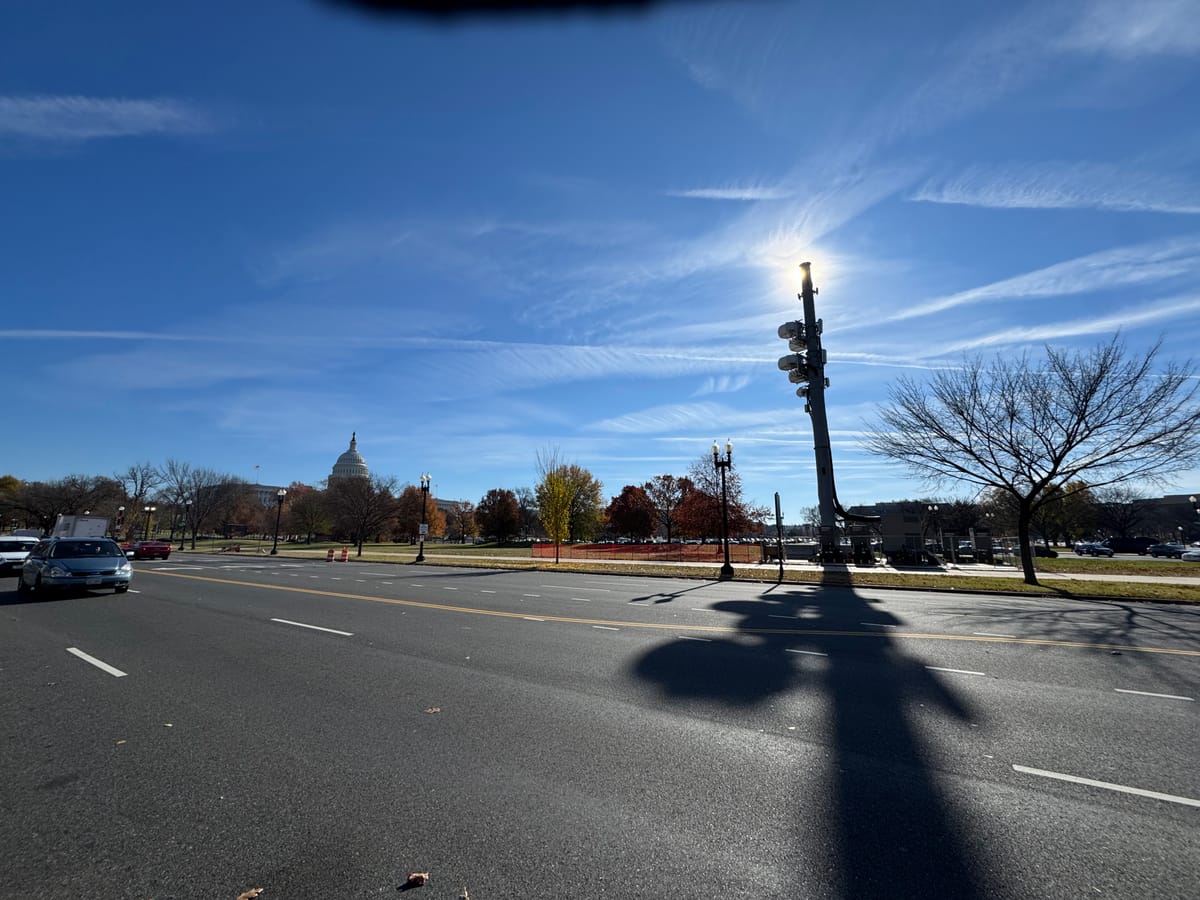
Good afternoon from Washington, where I’ve been holding down the fort for a tween, two dogs, and a growing end-of-year checklist.
I hope you and yours are well. If you’re receiving this message, it’s because you subscribed to CivicTexts: thank you! If you can, please consider upgrading to a paid membership or providing direct support.
Darkening horizons for sunshine in government
As you may know, the open government nonprofit world has dramatically contracted over the past decade, at perhaps the worst possible time in American history for reduced focus on government transparency and accountability.
Unfortunately, this is my sector.
My colleague Daniel Schuman, who I worked with at Demand Progress and collaborated with at the Sunlight Foundation, published an important essay for the Bulwark today that lays out the landscape for open government nonprofits in the United States in late 2024.
" I've worked at these organizations for fifteen years and the work they do is essential to our democracy. They identify government waste, fraud, abuse, & malfeasance. Without them, there can be no government accountability. They fight an endless war against bureaucratic stupidity, butt-covering, cronyism, and cynicism. Victories are won by allowing sunlight to illuminate nonsense, and giving truth-tellers the tools to share their stories and protect themselves from retaliation. They make it possible for political systems to work for the people. But this kind of work is not glamorous, or fashionable, and democracy funders have taken their eye off the ball. As the open government organizations are ground up, their remains lubricate the gears of misinformation, political warfare, and crony capitalism."
While Daniel doesn't mention it, it's worth noting that the good governance team I worked with at the Demand Progress Education Fund is now down to Sean Vitka, the policy director, whose primary focus is on Internet freedom, privacy, and surveillance reform – the bread and butter of that organization, which continues to be in transition after David Segal left last year.
If you're unfamiliar with the space, there are still worthy nonpartisan nonprofits who do phenomenal work on open government that you and others can support at year's end.
ProPublica and the Center for Public Integrity report in the public’s interest, informing us of what is being done in our name by governments and holding corporations accountable.
The Center for Responsive Politics adds sunshine to campaign finance, publishing open government data at OpenSecrets.org.
The Project on Government Oversight fights corruption, defends the Freedom of Information Act, and works to improve oversight and government integrity in all three branches of government.
Protect Democracy monitors, investigates, and litigated against any anti-democratic actions taken by the Executive Branch of the United States.
MuckRock makes it easy to make Freedom of Information Act requests, publishes the responses, reports on the documents and data its users bring into the sunshine, and much more.
The Reporters Committee for Freedom of the Press, Committee to Protect Journalists, and Reporters without Borders protect and defend press freedom, bringing important freedom of information lawsuits and supporting journalists.
Full transparency
I've effectively been volunteering my time since the Digital Democracy Project spun out from the Demand Progress Education Fund last September, but I'm now out of runway and into my retirement funds.
I'm proud of our collaboration to the transparency roundtable I co-founded with Daniel in 2017, my service on the U.S. FOIA Advisory Committee at the National Archives, the expertise I’ve provided to press, officials, and staffers, and the public comments I’ve made this last year in support of open government in the United States government.
The coalition letter supporting transparency reforms at the Office of Special Counsel is a prime example of the work Daniel champions.
This newsletter has been an important venture for me in 2024, with slow but steady growth. Unfortunately, it's not even close to sustainable at year's end.
The changing conditions for press freedom in the United States also mean that continuing to work independently may carry increasing legal and financial risks for me and my family if I continue to watchdog good governance in Washington, DC without more of a net.
I'm not going to stop writing here or on social media just yet, but I am actively looking for new opportunities to make ends meet. (I clearly erred in not mining Bitcoins a decade ago!)
If you or your organization could benefit from my expertise or skills, please reach out: alex@governing.digital.
If you can afford it, I would welcome your support for my past, present, and future work on open government today.
Daylight Saving: The Wrong Kind of Sunshine Reforms
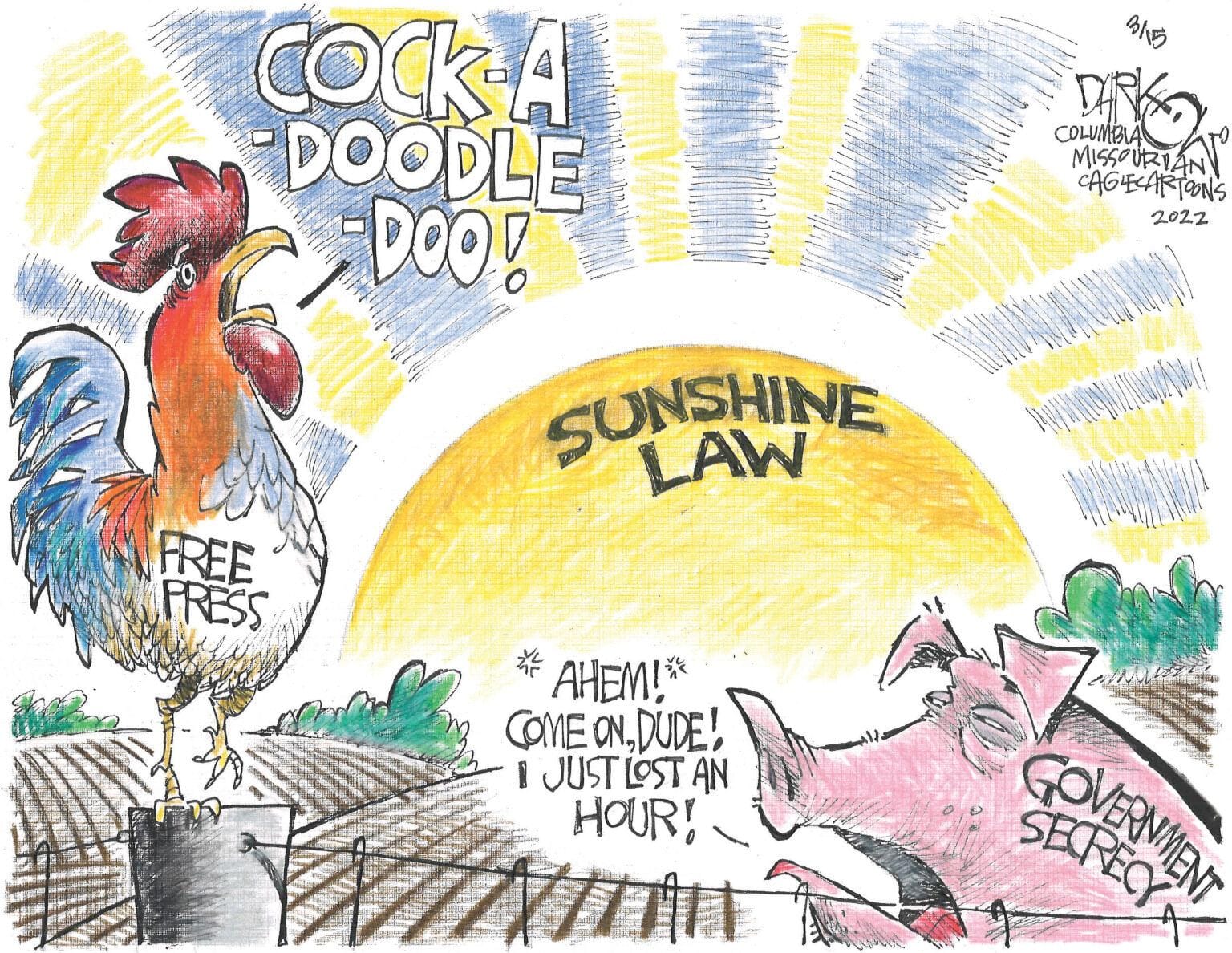
If you missed it, President-Elect Donald Trump tweeted last week that the “Republican Party will use its best efforts to eliminate Daylight Saving Time, because “Daylight Saving Time is inconvenient, & very costly to our Nation.”
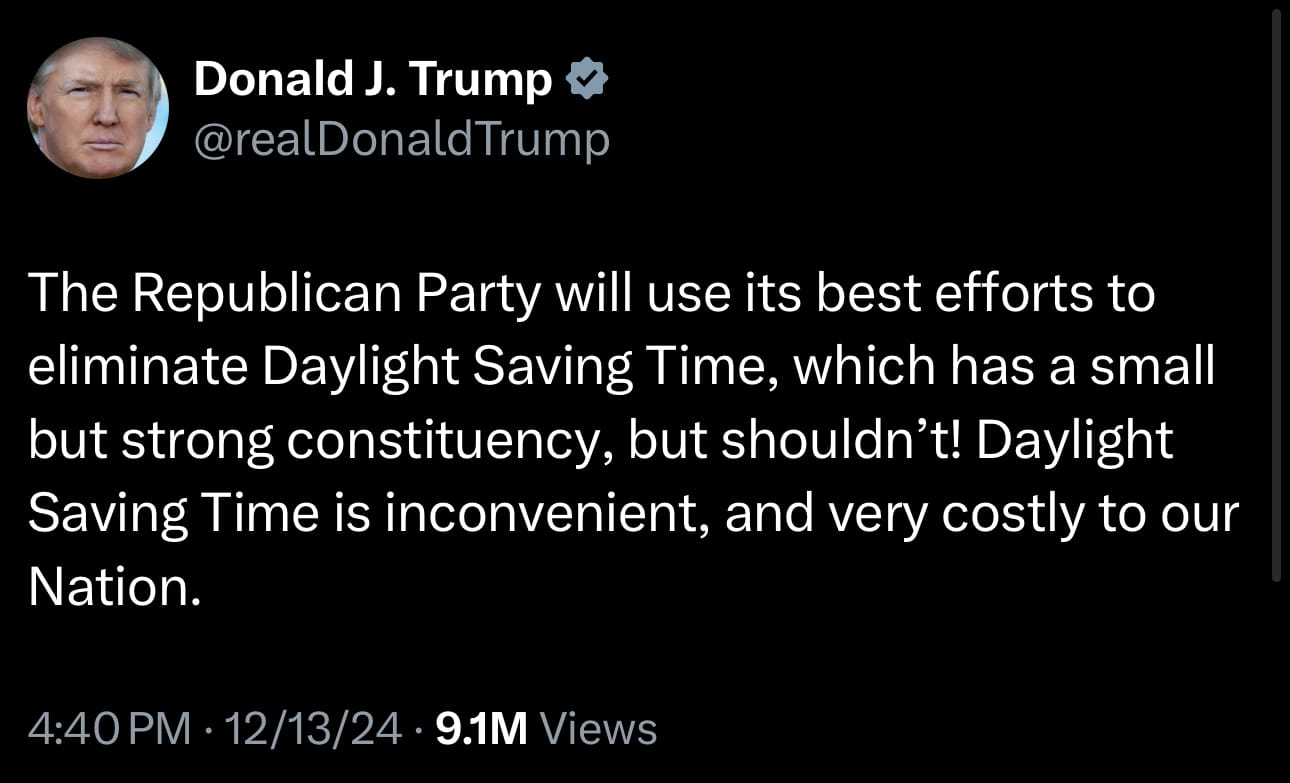
DST is not, however, just a costly inconvenience. Sleep doctors and scientists say eliminating DST would improve the health of all Americans.
As I told Senator Sheldon White House (D-RI) over on Bluesky, the bill he championed with Senator Marco Rubio would make Daylight Saving Time (DST) permanent.
It’s the wrong approach. As with all animals, morning sun is critical to maintaining human circadian rhythms and health. The American Academy of Sleep Medicine supports year-round national standard time — not DST.
So do I. This would have a significant impact on almost every American, with positive effects on our health and sense of well-being. As with everything Trump tweets, however, don’t trust it until something happens.
The human cost of truth decay and lost trust
I read an important follow-up story from the Washington Post this weekend reporting out how some Americans now distrust FEMA so much they’re hesitant to apply for disaster relief:
Gilmore’s reluctance to seek out federal aid underscores one of the more unusual elements of Hurricane Helene’s aftermath in western North Carolina, according to data, experts, residents and FEMA officials.
Only about 15 percent of households in the affected region have applied to the agency for individual and household assistance, according to a Post analysis of months of FEMA data up to the second week of December. It’s a low number, three independent experts and a FEMA official said, given how many people are in need. It’s far less than Georgia and South Carolina, states that sustained comparatively less damage, but where about twice as many households have applied.
Rampant misinformation and conspiracy theories early on about FEMA’s motives and plans inflamed a long-existing skepticism about government here. That, combined with a federal response that has been trying to navigate complex logistics in a region that is not used to big disasters, is threatening people’s chance to get critical help and, ultimately, the state’s ability to rebuild.
Advanced truth decay and low trust are a recipe for breakdown in social cohesion in the next pandemic, natural disasters — or war.
Poisonous lies and propaganda combined with the inability of this administration to effectively communicate with all of the American people where we are have further eroded public trust.
President Biden was unable or unwilling to demand better public engagement & delivery from his administration. His diminished capacity as a public communicator and his staff decisions to limit press conferences, town halls, and online forums unfortunately coincided with a historic degradation of our discourse by partisans willing to lie and spread rumors and conspiracies for personal profit and political gain.
Biden called Trump a liar after in September, and of course he was right. Trump’s conduct was abhorrent. He lied to Americans about the White House working with governors after a hurricane, politicizing disaster response just as he did pandemic response & elections. And some of us believed him.
But when Biden said “doesn’t know why Trump does this,” he missed the moment, again.
Trump tells lies to divide Americans for his own personal and political benefit. Disinformation — lies intended to harm — is a key part of the “Authoritarian Playbook” deployed by autocrats around the world.
What Trump did during the pandemic — when he was the primary source of misinformation while declining to tell us COVID was airborne & deadly — and then the Ohio railway derailment was a template for his lies now, after a hurricane.
But this White House didn’t change its approach.
When asked why Trump spreads misinformation in October, Biden said “I don’t know. I simply don’t know. You can speculate. I’ve used the phrase more than I have in my entire career: It is un-American.”
He should have asked our union’s experts on authoritarianism. Like other autocratic strongmen throughout world history, Trump disinforms to divide, distract, deceive, & destroy hope & trust in our democracy.
He was desperate to evade accountability for conspiring to overturn the election by regaining power.
He succeeded, after nearly every institution in American society failed.
This White House did not respond to the threat with truth and transparency delivered using all of the modern tools available in the U.S. government.
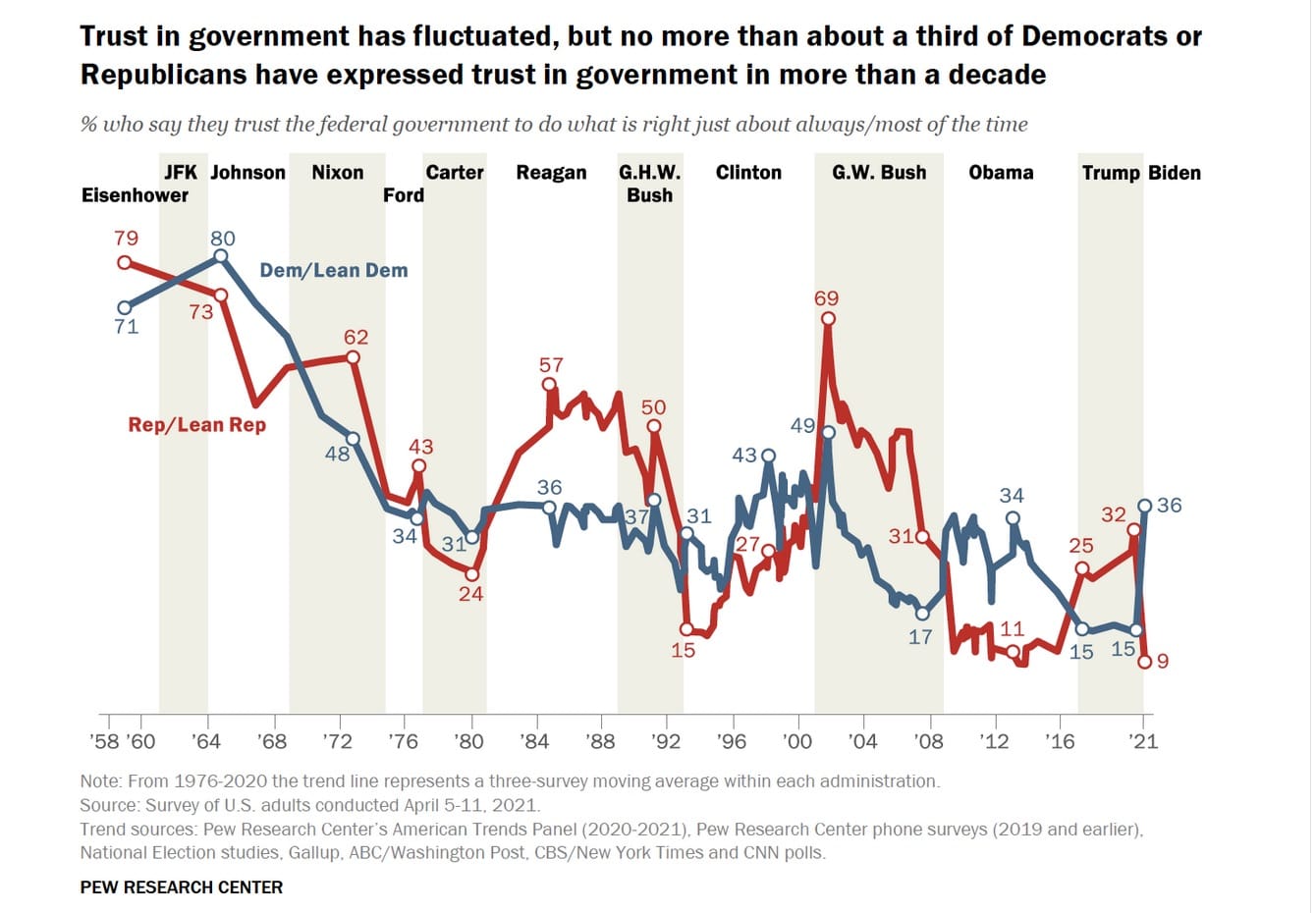
But public trust in US government was high once, under Dwight D. Eisenhower. It has now fallen to historic lows since, for good reasons.
Key inflection points:
📉Vietnam
📉Watergate
📉Stagflation
📉Long War in Iraq & Afghanistan after 9/11
📉2008 financial crisis
📉Pandemic
📉Official lies + propaganda
📉Failure to convict Trump
The deliberate seeding of mistrust, division, and discord with lies & mistruths over our lifetimes is a huge part of the truth decay we see today.
Now, winter is coming.
South Korea shows how a healthy democracy reacts to an attempted auto-coup
South Korea’s parliament impeached President Yoon after he declared martial law.
Yoon’s powers & duties are suspended.
Prime Minister Han Duck-soo took over.
Korea’s Constitutional Court now has up to 180 days to decide to restore or dismiss Yoon, prompting a fresh election.
Imagine that: accountability, instead of unconstitutional immunity and looking past the plain language of a Constitutional amendment disqualifying an U.S. official from running for office if they engage in insurrection or provide aid and comfort to those who do so — including promising to pardon people convicted of assaulting police or seditious conspiracy.
A TikTok ban just got real
A federal appeals court ruled last week that the law banning TikTok if Bytedance does not divest is constitutional.
I dissent. The Court found the government’s national security arguments compelling.
I still don’t.
U.S. teens are almost all online
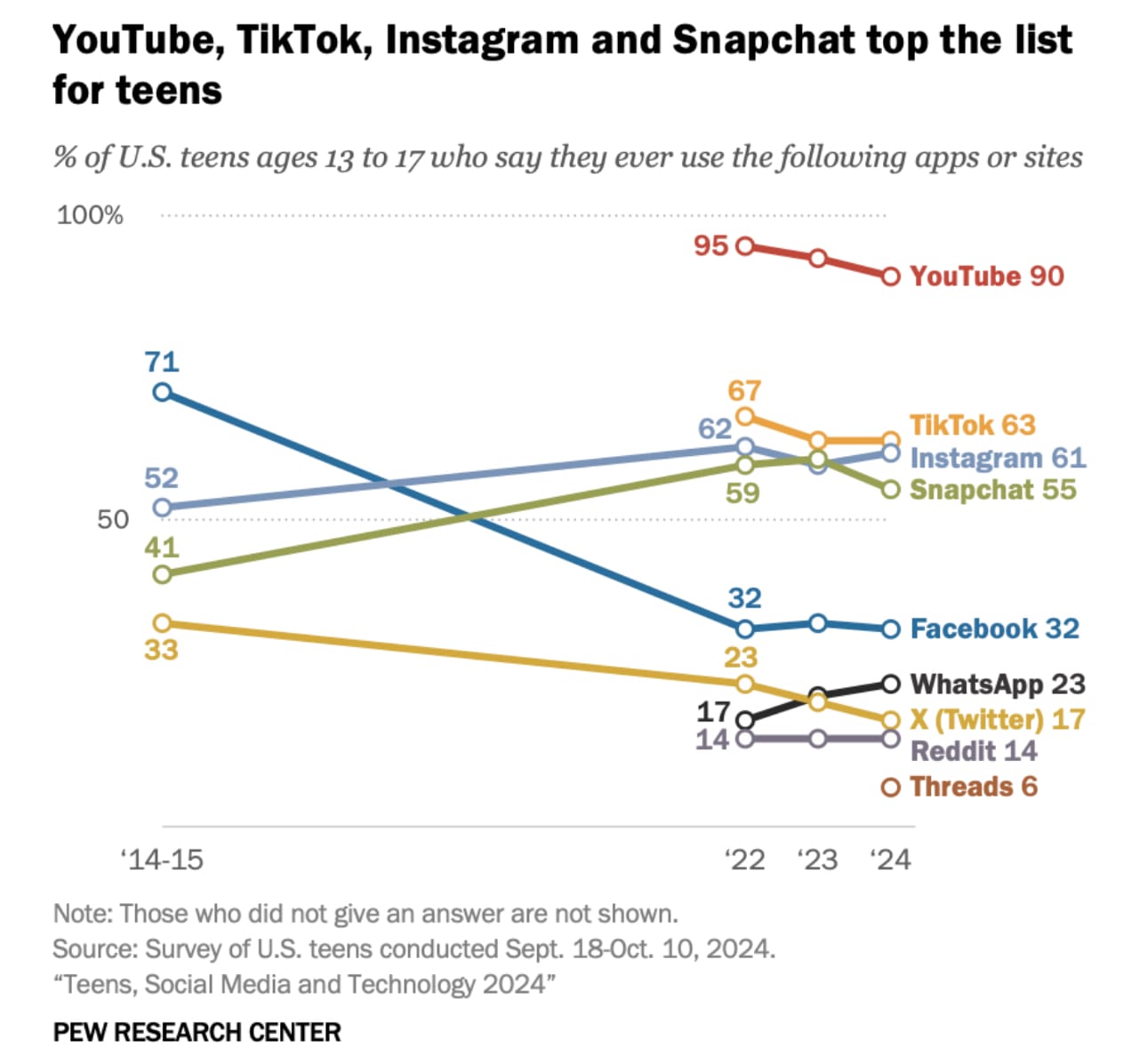
Most Americans teens don’t tweet, but they are on YouTube, Instagram, Snapchat, and yes, TikTok, per the Pew Research Center. Pew found American teens are mostly on YouTube, TikTok, Snapchat, & Instagram. (Pew told me they’ll ask if adults & teens are using Bluesky in 2025. Folks on Bluesky said Pew shops have asked about Discord and Twitch.) A steep decline in Facebook use since 2014 is notable, as is the dropoff on Twitter.
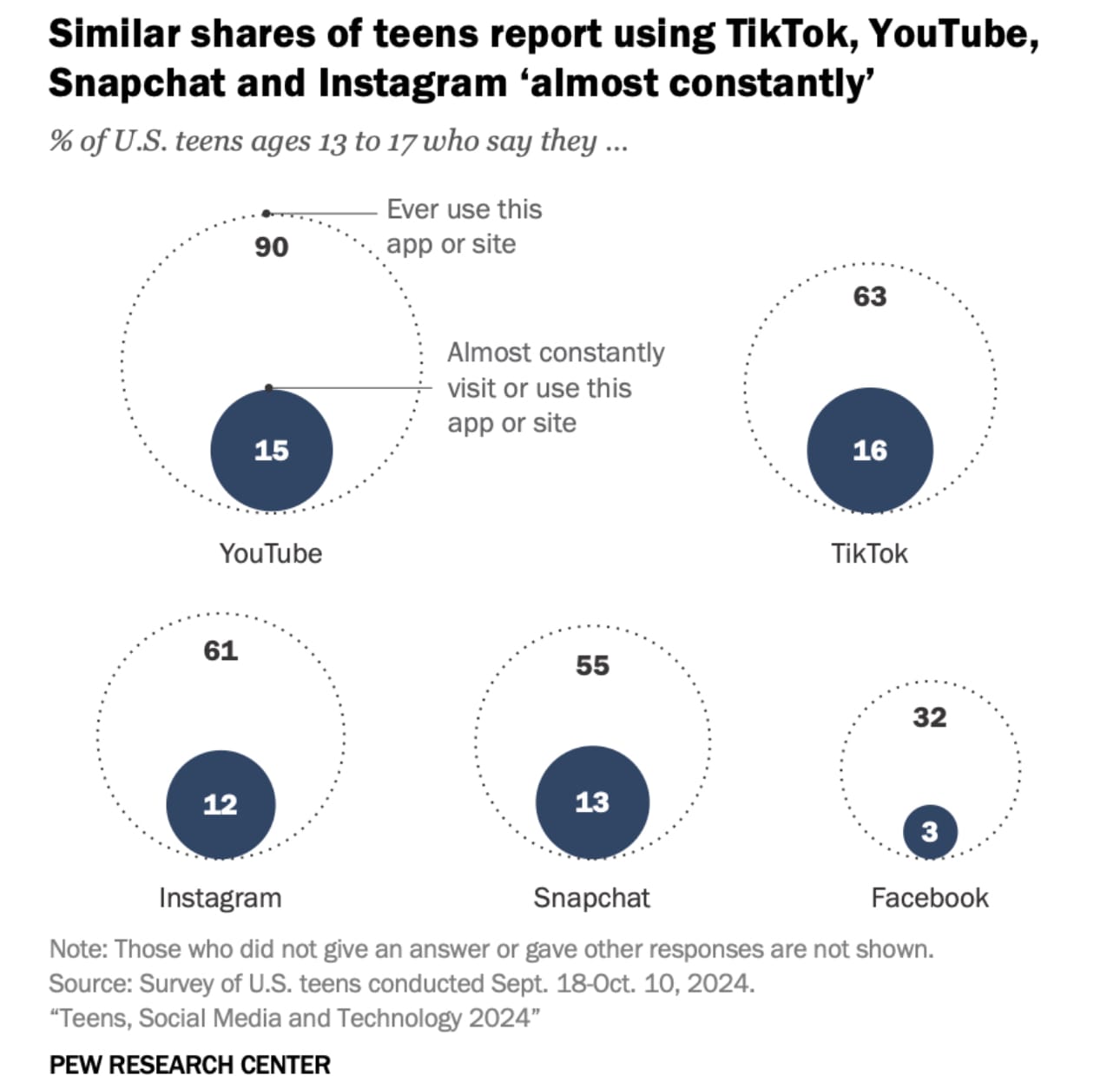
It was interesting to learn that about an eighth of Americans teens report using social media almost constantly, as a fellow who’s been online since 1993 and definitely didn’t spend the last 2 decades that way himself. Even more — about half — are online almost constantly.
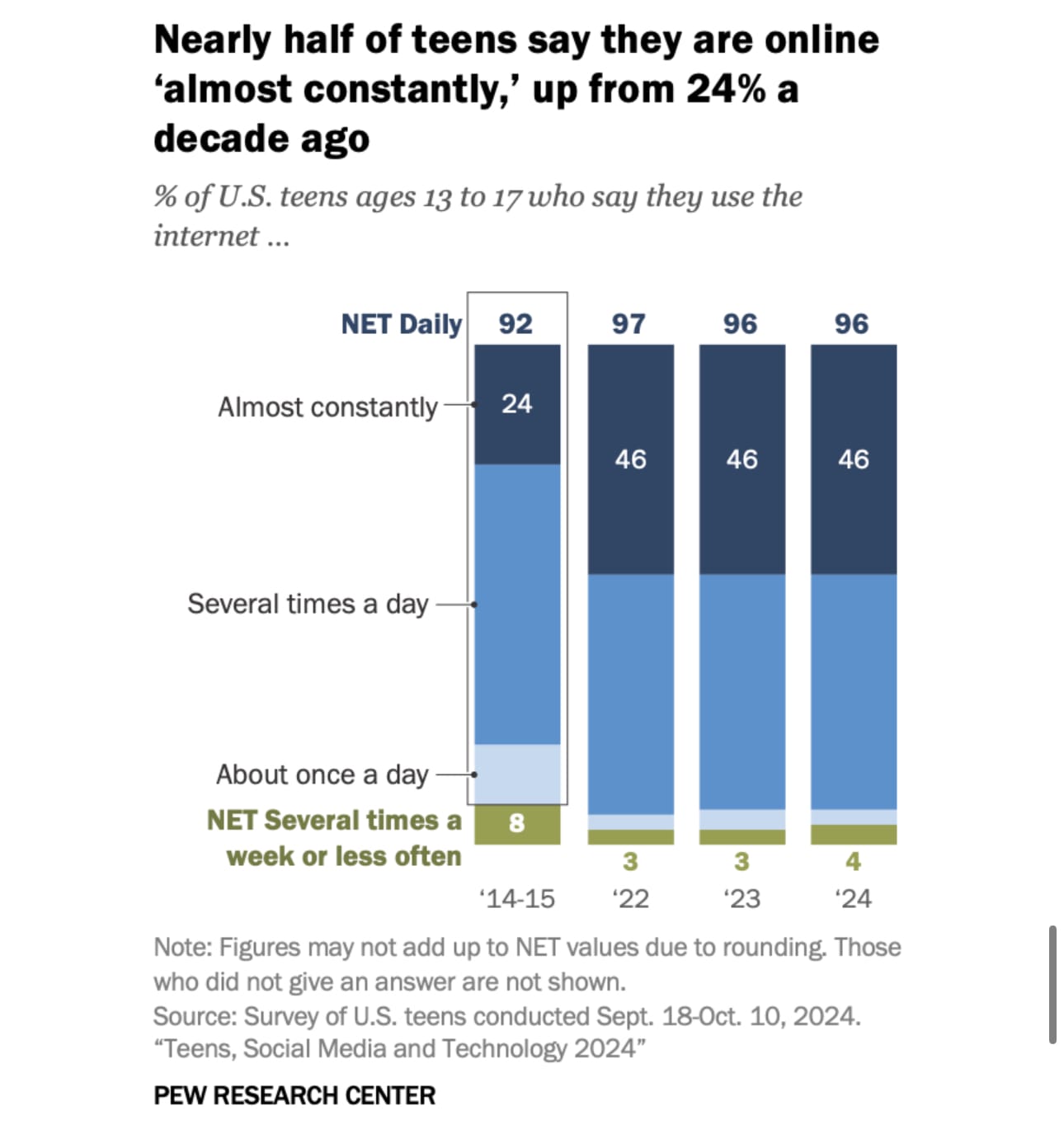
Smartphones connected to the Internet – our pocket tablet supercomputers — mean teens can be online constantly, & about half of them are, given 95% smartphone adoption. (Interesting to see that’s stable over the past 3 years.)
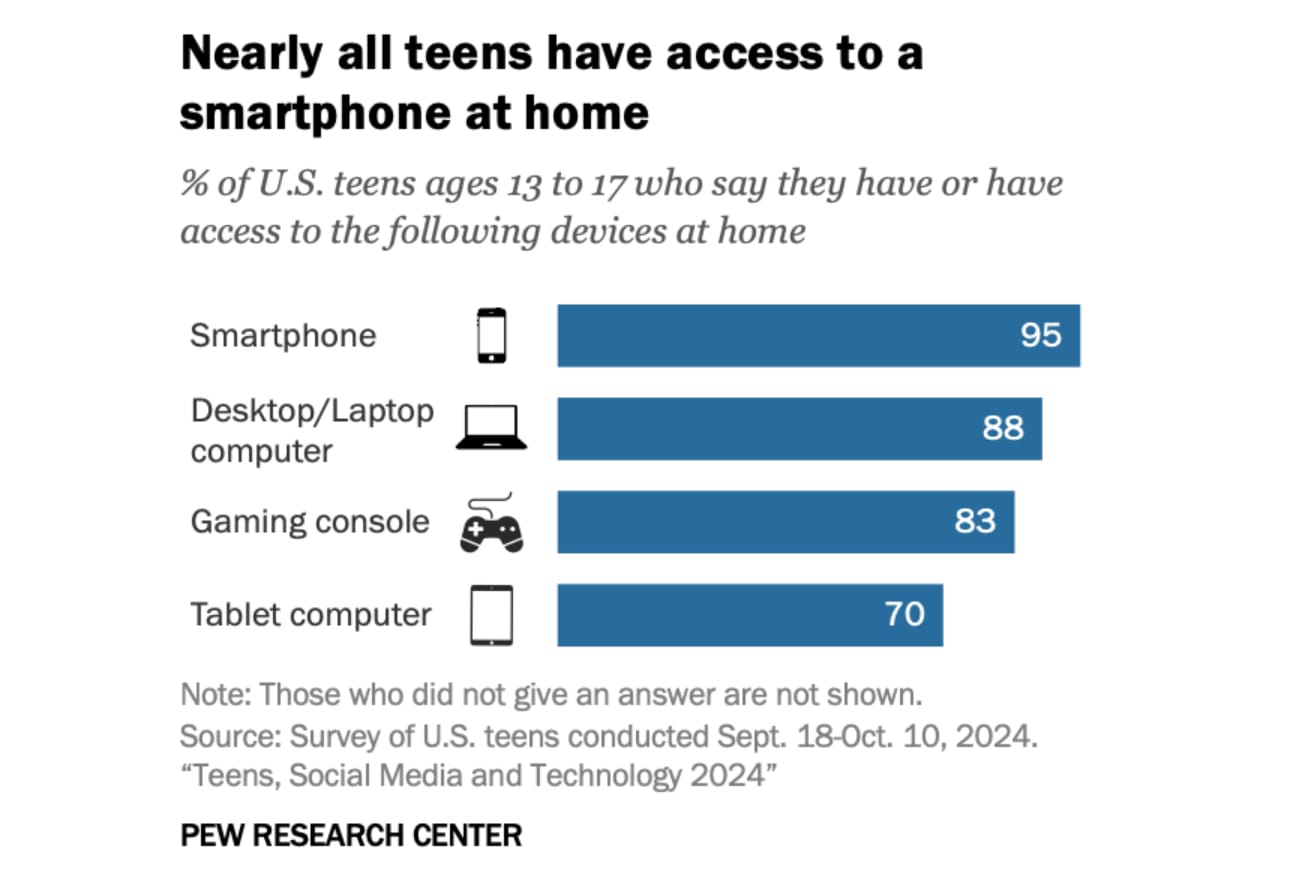
I doubt it will get as much attention as the top line takeaways, but overall usage of social media platforms by US teens masks significant differences around race.
Pew found about a quarter of Black & Hispanic teens are on TikTok/YouTube constantly, compared to 7-8% of White teens.
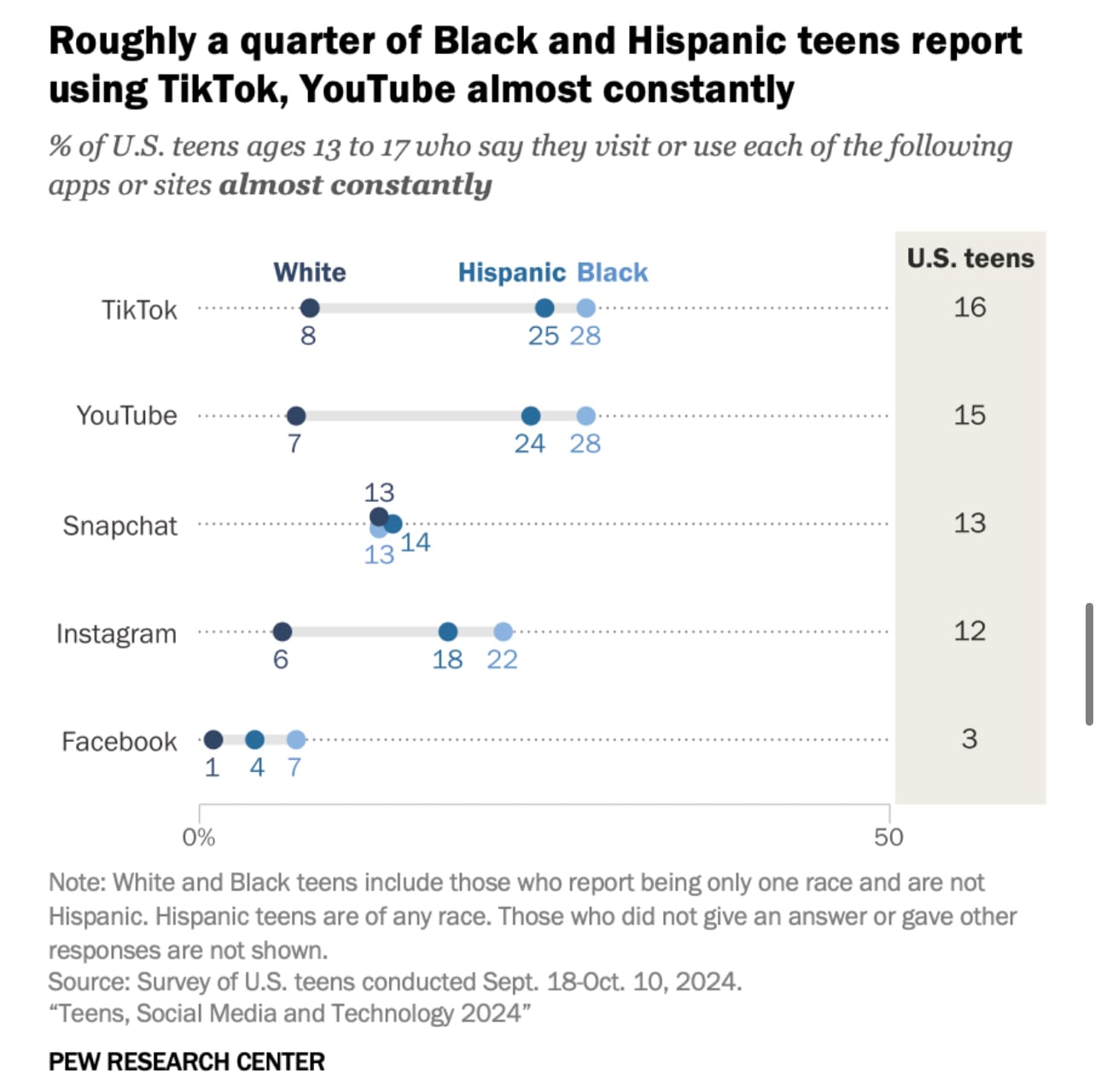
One thing we know most teens are not doing now? Reading a newspaper.
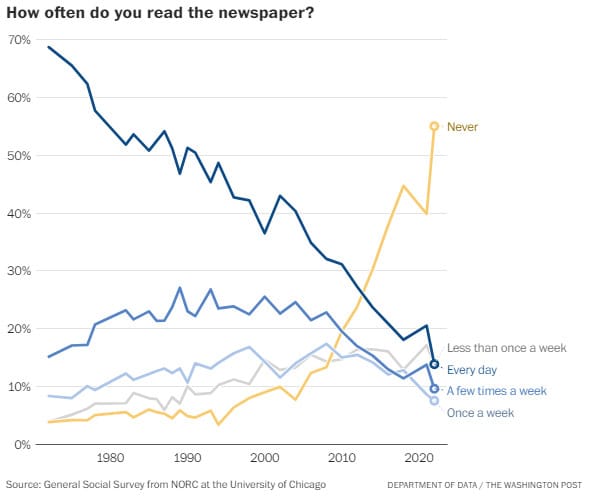
Historic telecom hack means you should be shifting to Signal
If you missed the news, heads up: Americans are not secure in our calls or texts. A Chinese hacking campaign, which officials have called “Salt Typhoon,” has compromised the communications of many Americans.
The FBI and Cybersecurity and Infrastructure Security Agency (CISA) recommended that we all switch to encrypted messaging, like Signal, and phone calls.
There is considerable irony in the FBI doing so, given their demands for technologists to nerd harder“ to break encryption and provide backdoors to our personal papers. But, here we are.
You can learn how to be more secure at this (gift 🎁) article.
Is it a bird? Is is a plane? Is it a satellite? Is it a secret drone?
After weeks of escalating concern about mystery drones on the East Coast of the United States, I’m thinking much more about unmanned aerial, marine, and terrestrial vehicles — drones, for short — and government transparency, or the lack thereof.
This newsletter is long enough, however, so I’ll save that for a future edition after we’ve learned a bit more about what’s in the skies and why.



